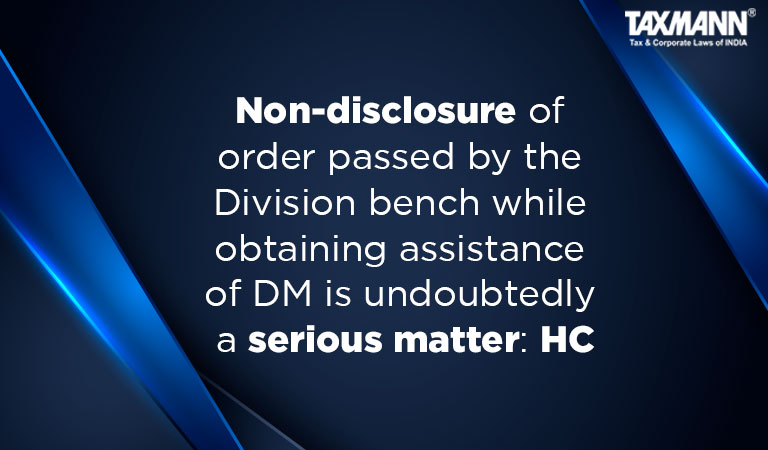Non-disclosure of order passed by the Division bench while obtaining assistance of DM is undoubtedly a serious matter: HC
- Blog|News|FEMA & Banking|
- 2 Min Read
- By Taxmann
- |
- Last Updated on 8 November, 2022

Case Details: Tapasi Routh nee Sinha Roy v. State of West Bengal - [2022] 143 taxmann.com 368 (HC-Calcutta)
Judiciary and Counsel Details
-
- T.S. Sivagnanam & Bivas Pattanayak, JJ.
- D. Saha Roy, S.N. Mitra, Pingal Bhattacharyya, Subhankar Das, Neil Basu, Advs., Amitesh Banerjee, Ld. Sr. St. Counsel, Tarak Karan, R.C. Prusti & Sanjib Das, Advs. for the Appearing Parties.
Facts of the Case
In the instant case, a loan was obtained by the borrower from the respondent-bank. In order to secure the said loan, the borrower mortgaged its immovable properties. The loan having remained unpaid, the bank approached District Magistrate (DM) u/s 14 of the SARFAESI Act, 2002 for assistance in taking possession of secured assets, which was allowed by the District Magistrate (DM) and directions were issued to police authorities to enable the bank to obtain actual physical possession of the mortgaged property.
The appellant claimed to be in possession of the property had challenged the said order on the ground that the Division Bench of the Writ Court had observed that the appellant could be evicted from the premises in question only by due process of law and it was for DM to decide what was meant by due process of law in fact and circumstances of the case. Therefore, the Bank ought to have placed the said order before DM before he could exercise jurisdiction under section 14(1) of the Act.
However, the bank didn’t disclose about the order passed by the Division Bench to DM. The Single Judge was of opinion that non-disclosure was not fatal to the application under section 14 of the Act.
High Court Held
The High Court observed that the Bank being the lender ought to be fair by placing all materials before the concerned authority and non-disclosure especially when it was an order passed by the Division Bench was undoubtedly a very serious matter and prejudicial to the interest of the appellant as DM had no occasion to make any observations as regards the effect of such order.
The High Court held that the order passed in Single Judge was to be set aside and consequently, the order passed by DM was to be quashed and the matter was remanded to DM with a direction to the bank to place all materials. Thereafter, DM should afford an opportunity of being heard to the Bank as well as the appellant and take a fresh decision on merits and in accordance with the law.
List of Cases Reviewed
-
- Order passed in W.P. No. 7039(W) of 2018, dated 21-2-2019. (para 14) reversed.
Disclaimer: The content/information published on the website is only for general information of the user and shall not be construed as legal advice. While the Taxmann has exercised reasonable efforts to ensure the veracity of information/content published, Taxmann shall be under no liability in any manner whatsoever for incorrect information, if any.

Taxmann Publications has a dedicated in-house Research & Editorial Team. This team consists of a team of Chartered Accountants, Company Secretaries, and Lawyers. This team works under the guidance and supervision of editor-in-chief Mr Rakesh Bhargava.
The Research and Editorial Team is responsible for developing reliable and accurate content for the readers. The team follows the six-sigma approach to achieve the benchmark of zero error in its publications and research platforms. The team ensures that the following publication guidelines are thoroughly followed while developing the content:
- The statutory material is obtained only from the authorized and reliable sources
- All the latest developments in the judicial and legislative fields are covered
- Prepare the analytical write-ups on current, controversial, and important issues to help the readers to understand the concept and its implications
- Every content published by Taxmann is complete, accurate and lucid
- All evidence-based statements are supported with proper reference to Section, Circular No., Notification No. or citations
- The golden rules of grammar, style and consistency are thoroughly followed
- Font and size that’s easy to read and remain consistent across all imprint and digital publications are applied



 CA | CS | CMA
CA | CS | CMA
